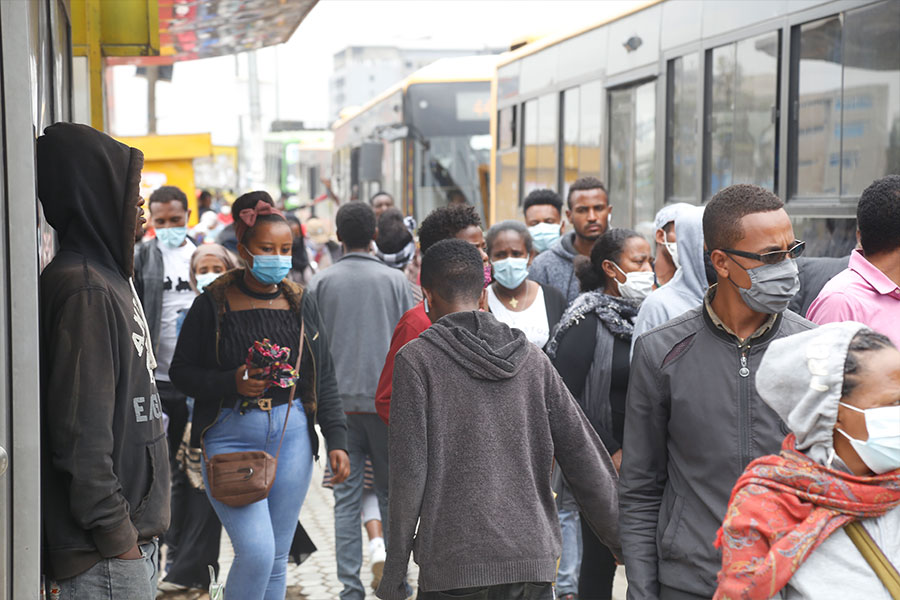
Viewpoints | May 31,2025
Aug 8 , 2020
By GELILA SAMUEL ( FORTUNE STAFF WRITER
)
Ethiopia's sovereign credit rating received a negative outlook by Moody's Investors Service, a credit rating firm, due to the country's existing fiscal and external peril, compounded by the Novel Coronavirus (COVID-19).
The Agency further stated that the pandemic shock will manifest in high-income inequality and exacerbated levels of poverty that have the potential to stoke social discontent.
The current negative outlook conferred on Ethiopia translates into low confidence in the country's credit profile. Poverty coupled with weak governance, particularly among state-owned enterprises (SOEs), has contributed to the low outlook. The dependency of the country on rainfall for its agriculture and energy have also been cited as reasons for the negative outlook, as periodical droughts can potentially put the sector in jeopardy.
Agricultural output like coffee, the main export commodity of the sector, as well as gold, are vulnerable to commodity price shocks during a period of volatile external conditions like the pandemic. These set-ups in the country have translated to a slowdown in GDP projections of up to two percent in this fiscal year as well as the next one.
This is despite the government's huge bet on domestic revenue collection, covering 64pc of the current fiscal year's budget, of which 19.6pc is expected to be covered by foreign loans and assistance. Moody's estimates Ethiopia's external financing requirements will amount to 6.6pc of GDP in this fiscal year. Ethiopia's capacity to secure external funding is uncertain, as Moody's reports, and failure to cover the country's needs in this way could sharply increase the pressure on its liquidity and balance of payments.
The country's fiscal vulnerabilities are compounded by a large and financially weak SOE sector, aggravated further by the economic shock, according to Moody's.
The government, however, is taking steps to reform SOEs drowning in debt, which is compounding its fiscal vulnerabilities. It has initiated the formation of an Asset & Liability Management Company, which will manage investment activities, assets and liabilities of the enterprises and absorb a little over half a trillion Birr in residual debt, which the enterprises cannot currently attend to.
The government has also introduced an all-encompassing programme of new policy prescriptions by Prime Minister Abiy Ahmed's (PhD) administration, dubbed the Homegrown Economic Reform Agenda, which aims to work toward macroeconomic, structural and sectoral reforms. The masterplan for the economic reform of the country did not score points for the credit profile as the rating agency doubts the delivery of the agenda.
This same institution has been painting the country's economy with flying colours for the last few years, and this is a sudden shift from their track record of a narrow and myopic report, according to a macroeconomist who wanted to remain anonymous.
"Economists for the last five years have been trying to debunk the colours they were putting up by actually showing the structural and policy problems," he said. "Extenuating the issue now may be good, but the fundamental problem in the country lies in the political situation, which needs to be immediately addressed."
The review for the downgrade came after Ethiopia’s participation in the G20 Debt Service Suspension Initiative, which applies to eligible countries and all countries defined as "least developed." However, the current B2 rating remained intact after Ethiopia affirmed its stance that it will not ask private creditors for relief.
Participation in the Initiative, set up for countries that will require liquidity and financing support during the crisis caused by the pandemic, will likely be considered a default under the Agency’s definition. Moody's negative outlook indicates a redemption is unlikely in the short term.
These ratings just give a view from the creditor's perspective and don't reflect purely on economic assessments, according to Atlaw Alemu (PhD), a lecturer at Addis Abeba University's Faculty of Business & Economics.
"The pandemic doesn't apply only to Ethiopia," Atlaw said. "The whole global economy is undergoing an economic recession."
The current situation is like the saying "before it gets calm, there has to be a storm," according to the macroeconomist.
"If the government actively addresses the political issue, the rest are problems like the social paradigm that can be fixed," he said.
Regardless, these private creditors' loans do not go well with the country's status, as most of the loans of the country are sourced from long-term loans with a different spectrum, according to Atlaw, who believes this is inconsequential for the country.
"Rather, the country should focus on sorting out its internal political affairs and work with unity to fight against the raging pandemic," Atlaw said. "The country should actively work on going forward with the reform it's currently undertaking."
PUBLISHED ON
Aug 08,2020 [ VOL
21 , NO
1058]

Radar | Dec 19,2021

Fortune News | Apr 25,2020

News Analysis | Aug 07,2021


View From Arada | Jan 07,2023

Dec 22 , 2024 . By TIZITA SHEWAFERAW
Charged with transforming colossal state-owned enterprises into modern and competitiv...

Aug 18 , 2024 . By AKSAH ITALO
Although predictable Yonas Zerihun's job in the ride-hailing service is not immune to...

Jul 28 , 2024 . By TIZITA SHEWAFERAW
Unhabitual, perhaps too many, Samuel Gebreyohannes, 38, used to occasionally enjoy a couple of beers at breakfast. However, he recently swit...

Jul 13 , 2024 . By AKSAH ITALO
Investors who rely on tractors, trucks, and field vehicles for commuting, transporting commodities, and f...

Jul 5 , 2025
Six years ago, Ethiopia was the darling of international liberal commentators. A year...

Jun 28 , 2025
Meseret Damtie, the assertive auditor general, has never been shy about naming names...

Jun 21 , 2025
A well-worn adage says, “Budget is not destiny, but it is direction.” Examining t...

Jun 14 , 2025
Yet again, the Horn of Africa is bracing for trouble. A region already frayed by wars...